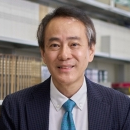カリキュラム
4年間の学びの流れ
文学部では、学生の皆さんが学びたいことを思う存分に学び、進むべき進路を考え・決定し、そしてそれらに必要な力を身につけてもらえるよう、下記のようなカリキュラムを組んでいます。

2026年度入学者以降カリキュラム(5コース・1専修)
英語・英語文化コース
英語・英語文化コース
グローバルな視点を身につけ、実践的な英語力と人間性を養う
グローバル社会に貢献できる実践的な英語コミュニケーション能力と異文化理解の力を備え、幅広い分野で活躍できる人材を育成します。

開講科目
イントロダクトリー
- 英語文化への招待
ベーシック
- 英語音声学
- 演劇入門
- 文学を通して学ぶ英語
- Communicative English I
- Communicative English II
- English Writing
- 英語グローバルコミュニケーション
- 比較文化I
- 比較文化II
- 英語学概論
- 英米文学概論
- 現代英文法
- アメリカ文学史
- イギリス文学史
- 英米文学講読I
- 英米文学講読II
- 英語科教育法I
- 英語科教育法II
アドヴァンスト
- 英語史と文化
- 英語コミュニケーション論
- 第二言語習得論
- 英語と国際理解教育
- 演劇論
- Literature I
- Literature II
- Cultural Representation I
- Cultural Representation II
- 英語翻訳論
- 英語通訳演習A
- 英米児童文学研究
- 日英翻訳演習
- 英語通訳演習B
- 英語科教育実践演習Ⅰ
- 英語科教育実践演習Ⅱ
- 英語科教育法III
- 英語科教育法IV
- Text Studies
開講ゼミ一覧
英語学
藤本 和子 教授
言葉はたえず変化しています。現代英語の変化や使用を学ぶとともに、英語と社会や文化との関係を考えていきます。このことは、言語と人間社会が、いかに密接に関係しているかという発見につながります。日常生活の中での言葉遣いについて「なぜだろう?」と考える姿勢を養い、場面や状況に合わせた英語使用、話し言葉・書き言葉の違い、フォーマル・インフォーマルな言葉遣いの違い、英語表現の容認度の違いを認識した効果的な英語運用ができることをめざします。

第二言語習得研究・英語教育
大崎 さつき 准教授
「やる気はどうやって維持すればいいの?」「効果的な勉強法とは?」など英語学習に関する疑問に対して知見をもとにした「解答」を与えてくれるのが第二言語習得研究です。本ゼミでは、学習者の多様性に着目しながら、第二言語習得研究にもとづいた効果的な学習方法や指導方法を探求していきます。

人間主義英語教育:その理論と実践
尾崎 秀夫 准教授
人間主義英語教育の特徴は、① 外国語の習得には知識・スキルだけでなく、学習者の人間性の変容が求められる、② 知識・スキルの習得と人間性の変容を統合していく過程に価値創造が含まれる、と考えることです。人間主義英語教育の理論と実践を学び、人間主義英語教育のエキスパートを育成することが当ゼミの目標です。

英米児童文学
熊田 岐子 准教授
児童文学には、当時の時代背景・文化背景はもちろんのこと、子どもがどのように捉えられてきたか、教育されていたかが映し出されています。本ゼミでは、様々な背景を持つ児童文学を取り扱い、英米の歴史・文化・思想・教育観等を辿っていきます。同時に、扱った児童文学が影響を受けている文学作品にも触れることで、知識を深めていくことを目指します。

シェイクスピア劇と翻案
馬 玉晶 講師
シェイクスピアが時代や国境を超えて人々を魅了するのは、彼の作品の多様なアレンジやさまざまな解釈が可能であるからです。このゼミでは、シェイクスピア劇が映画、マンガ、現代劇の中で、どれだけ翻案されてきたか、かつシェイクスピアとポピュラー・カルチャーはどのような関わりがあるかを、社会的・文化的文脈から考察していきます。

英米クィア文学
藤倉 ひとみ 講師
英米文学の中でも、「クィア」(セクシュアルマイノリティ全般)的要素を含む文学、演劇、映画作品を取り上げ、これらの作品を通じて当時の英米のジェンダー観やセクシュアリティの概念について学び、作品に込められた作家の想いについて考察していきます。また、原作と演劇・映画を比較することで、いずれかでしか表現されない描写とその意図についても知ることができます。

日本語・日本文化コース
日本語・日本文化コース
幅広い視野で、世界に向けて「日本」を発信する力を育てる
母語である日本語を、学問的に深く理解し、客観的に言語を分析する力を身につけることで、国際的な場でも「日本」や「日本文化」を発信できる人材を育てます。

開講科目
イントロダクトリー
- 言語文化入門
- 英語文化への招待
ベーシック
- 日本語学概論Ⅰ
- 日本語学概論Ⅱ
- 日本語教育概論Ⅰ
- 日本語教育概論Ⅱ
- 日本語コミュニケーション論
- 言語学概論
- 社会言語学
- 社会で通用する日本語
- 日本古典文学概論
- 日本近代文学概論
- 第二言語としての日本語習得論
- 対照言語学
- 文化記号論
- 日本語音声学
- 現代日本語文法A
- 現代日本語文法B
- 年少者日本語教育
- 多言語社会と言語政策
- 日本文学史
- 日本古典文学講読
- 日本近代文学講読
- 国語科教育法Ⅰ
- 国語科教育法Ⅱ
- 言語類型論
- 日本文化体験
アドヴァンスト
- 日本語教材研究
- 日本語教授法
- 日本語教育実践
- 日本語の語彙・表記
- 日本語の表現
- 書道Ⅰ
- 書道Ⅱ
- 日本古典文学作家作品論A
- 日本古典文学作家作品論B
- 日本近代文学作家作品論A
- 日本近代文学作家作品論B
- 日本の芸能
- 国語科教育法Ⅲ
- 国語科教育法Ⅳ
- 漢文学特講Ⅰ
- 漢文学特講Ⅱ
- 日本語学特講
- 日本語教育実習
- 海外日本語教育実習
- 日本語教授法演習
- ディベート日本学
- 日本文学特講A
- 日本文学特講B
開講ゼミ一覧
明治語の研究
金子 弘 教授
現代語のルーツに直結する近代の言語としての「明治時代語」について考えます。現代語に近い明治期の日本語について理解を深めることによって、現代語に対する見方も養っていけます。

日本語学・日本語教育
山岡 政紀 教授
日本語教育を志す学生、現代日本語に強い関心を持つ学生を対象に、日本語のコミュニケーションにおける表現と機能の関係について時には他言語と対照しながら探究します。また、それを言語教育に応用する方法について学びます。

日本語教育
大塚 望 教授
共同研究や個人研究を通して、日本語をさまざまな角度から捉え分析します。その結果を日本語教育に応用する方法や日本人の言語生活の未来についても考えていきます。

第二言語習得研究、日本語教育
斉藤 信浩 教授
外国語を学習するとき、それがどのように習得されるのか、日本語や韓国語を題材に、主に量的な研究手法による言語の習得についての研究をしています。それらをどのように日本語教育に活用するかを探求していきます。

日本語教育
神村 初美 教授
多様な学習者を抱える日本語教育のイマココについて、多角的な視点で関連論文や資料を分析し討議していきます。ここから、未来につなぐ持続可能な日本語教育とは何か、ともに考えていきます。

社会・歴史・人類文化コース
社会・歴史・人類文化コース
個人・社会のWell-Beingの実現に役立つ本質を捉える洞察力と共感力を磨く
物事の本質を捉える洞察力と多様な人々への共感力を養い、個人や社会が抱えるさまざまな問題を解決するために主体的に行動できる人材を育成します。

開講科目
イントロダクトリー
- 表現文化論入門
ベーシック
- 文化人類学
- 民衆文化の人類学
- 国際関係論
- 社会学概論:人間
- 日本史概説Ⅰ:人間
- 日本史概説Ⅱ:人間
- 西洋史概説:人間
- 東洋史概説:人間
- 中国社会文化概論
- 現代ロシア概論
- 地理学Ⅰ:人間
- 地理学Ⅱ:人間
- 現代文化人類学
- 文化の社会学
- ジェンダーの社会学
- 宗教の社会学
- マンガの社会学
- 家族の社会学
- 日本文化史
- 歴史学概論
- ロシアの歴史と文化
- 民俗学
- 地誌学
- 日本地誌
- 法律学概論:人間
- 政治学概論:人間
- 社会科教育法Ⅰ
- 社会科教育法Ⅱ
- 地理歴史科教育法Ⅰ
- 地理歴史科教育法Ⅱ
- 公民科教育法Ⅰ
- 公民科教育法Ⅱ
- 世界遺産論初級
アドヴァンスト
- 文化と権力の人類学
- サブカルチャーの社会学
- 現代宗教の社会学
- 平和学
- 歴史と地域社会
- 歴史と人間
- パブリック・ヒストリー
- 世界遺産論中級
- 社会科教育法Ⅲ
- 社会科教育法Ⅳ
- サーベイ調査演習
- フィールドワーク実習
- 人文地理学
- 自然地理学
- 人間の安全保障
- 教育の社会学
- 歴史の社会学
- メディアの社会学
- 中国近現代史
- ロシア近現代史
- 古文書学
- 日本中世・近世史研究
- 日本近現代史研究
- 外国地誌
開講ゼミ一覧
日本古代・中世・近世史の基礎研究
坂井 孝一 教授
日本の古代・中世・近世の歴史について幅広く学びます。専門書から参考になる箇所を抜き出して輪読し、内容に関する討論を行い、日本社会の特徴や著名な人物の生き様について考えます。さらに、興味のあるテーマについて研究発表をしてもらい、各人の日本史に対する理解を深めます。

歴史社会学
小林 和夫 教授
これまで日本占領期のインドネシアに関する研究を進めてきました。近年の研究関心は、アジア・太平洋戦争と学知、科学の体制化、軍産官学複合体などです。「不思議なものを感じとる感性」を大切にしながら「歴史」の問題を社会学的な視点から考察します。歴史社会学的な問題設定、視覚、アプローチ、解釈を学び、「現代」でも展開・応用が可能な感性を身につけてください。

メディア文化研究・メディア史
倉橋 耕平 准教授
私たちの文化は、もはやメディアなしでは形成されません。政治家はメディア向けのパフォーマンスをします。ヒット曲はストリーミングの登場で曲が短くなりました。Netflixの作品がアカデミー賞を受賞しましたが、あれは「映画」ですか。このゼミは、現代メディア環境における文化変容や意味世界の謎を解明していくことが目的です。メディア文化、ナショナリズム、ジェンダー、政治、ジャーナリズムに関心のある方はぜひ一緒に学びましょう。

西洋史
帆北 智子 准教授
西洋(ヨーロッパ、アメリカ)の歴史について幅広く学んでいきます。各ゼミ生が自身の研究テーマを主体的に追究できるよう、歴史学の特徴やその基礎的な研究手法を学び、必要に応じて原語文献の読解もおこないます。また、西洋史という切り口から歴史を学ぶことによって、現代社会が抱える諸問題や世界のありように対する洞察力を養ったり、自己の探求や他者との相互理解にも深く目を向けたりといった、歴史学がもつアクチュアルな側面にも触れてほしいと思います。

ポピュラー・カルチャー研究
森下 達 准教授
わたしたちが日々親しんでいるマンガや映画といった文化は、社会の中でどのような位置を占めているのでしょうか? 受容のされ方に着目して、そうしたポピュラー・カルチャーのありようを考えていくのがこのゼミです。また、議論の中では、ストーリーや表現に目を向けることもあるでしょう。受容だけでなく、作品の表現を論じることも可能です。授業では主として、関心のある作品とその受容についての分析や、関連文献の紹介・批判などをやってもらいます。

東アジア史・中国伝統思想の現代的展開
村上 信明 教授
東アジア地域の歴史・文化・思想について学びながら、さまざまな社会や文化をもつ人々が共存する東アジア地域の多文化共生メカニズムと異文化交流の歴史について学んでいきます。また、中国の伝統思想である儒教や老荘思想を現代の私たちがどのように捉え、活用していけばいいのか、といったテーマについても学んでいきます。

文化人類学
井上 大介 教授
文化人類学における基本的な思考法をベースに、異文化理解に関する身近なテーマを設定し、論文作成のための文献蒐集を行い、関連文献ならびに調査の進展状況に関する発表を課題とします。

平和学・人間の安全保障研究
玉井 秀樹 教授
平和の実現をめざす学問が平和学です。あらゆる人が尊厳をもって生きる自由を追求する人間の安全保障という考え方に基づいて、私たちがめざすべき平和のあり方を検討し、その実現の方法を探究していきます。

表現文化コース
表現文化コース
さまざま芸術作品を深く理解し人生設計や表現力向上に活かす
歴史に残るさまざまな芸術作品に触れ、感性を磨き、自身の表現力の向上や人生のライフデザイン設計に活かしていける人材を育成します。

開講科目
イントロダクトリー
- 表現文化論入門
ベーシック
- 文芸批評Ⅰ:詩の分析と作詞法
- 文芸批評Ⅱ:小説・映画の分析法
- 世界文学
- 演劇入門
- 文芸創作Ⅰ
- 文芸創作Ⅱ
- 映画論
- 演劇教育論
- 中国文学
- ヨーロッパ文学
- 神話とフォークロア
- 日本文学史
- 日本古典文学講読
- 日本近代文学講読
- 英米文学概論
- 文学を通して学ぶ英語
- 比較文化I
- 比較文化II
- 日本古典文学概論
- 日本近代文学概論
- 文化記号論
- アメリカ文学史
- イギリス文学史
- 英米文学講読I
- 英米文学講読II
- マンガの社会学
アドヴァンスト
- ロシア文学
- 演劇論
- Literature I
- Literature II
- 日本古典文学作家作品論A
- 日本古典文学作家作品論B
- 日本近代文学作家作品論A
- 日本近代文学作家作品論B
- デザイン・アート演習A
- デザイン・アート演習B
- Kカルチャーと韓日文化交流Ⅰ
- Kカルチャーと韓日文化交流Ⅱ
- 文芸創作演習
- 演劇表現演習
- 日本文学特講A
- 日本文学特講B
- ダンスと身体表現
- 映像表現演習
- 作詞・作曲法演習
- 表現文化実践演習A
- 表現文化実践演習B
- 表現文化実践演習C
- サブカルチャーの社会学
- 美学美術史
- 書道Ⅰ
- 書道Ⅱ
- 英米児童文学研究
- 漢文学特講Ⅰ
- 漢文学特講Ⅱ
- Text Studies
- メディアの社会学
開講ゼミ一覧
アメリカ演劇
大野 久美 教授
ユージン・オニールをはじめとするアメリカ演劇の代表的な劇作家を取り上げ、心理学的な観点も踏まえて、台詞やそこに込められた作者の心に迫ります。また、さまざまな演劇を鑑賞し、演劇に親しみながら、人間にとって演劇とはどのような存在か、皆で考えます。

ロシア文学
寒河江 光徳 教授
ロシア・フォルマリズム、バフチン、ロートマンなどの論文を読みながら、文学作品を分析する理論について学習をしていく。

西洋哲学
伊藤 貴雄 教授
ヨーロッパ哲学史上最大の巨人であり、現代哲学の基礎を作ったカントの著作などを学びながら、グローバル化する現代の思想的・社会的課題への示唆を読み取り、問題解決への方途を探ります。たとえば、自由とは、正義とは、世界市民とは、等々の問いを皆で議論しながら、多角的な視点で世界秩序を捉え直していきます。さらに、哲学は、私たち自身の人生観・価値観を大きく広げ、深めてくれます。人類的古典(グレートブックス)に触れ、自分で考える勇気や、他人と討議する力を養い、未来を生き抜く「創造的精神」を身につける演習にしていきたいと思っています。
ロシア・フォークロア
中堀 正洋 准教授
ロシアをより正しく認識するために、現代もなお文学作品、絵画、映画、音楽、バレエなど、ロシア文化に影響を与え続けているロシア・フォークロアについて学びます。具体的には、ロシア革命前、20世紀初頭までを中心としたロシアの民衆文化、特に昔話、英雄叙事詩、本当にあった不思議な話、儀礼歌などの口承文芸、教会暦と民間暦、教会の祝祭や農耕・牧畜などの歳時儀礼について学んでいきます。

英米児童文学
熊田 岐子 准教授
児童文学には、当時の時代背景・文化背景はもちろんのこと、子どもがどのように捉えられてきたか、教育されていたかが映し出されています。本ゼミでは、様々な背景を持つ児童文学を取り扱い、英米の歴史・文化・思想・教育観等を辿っていきます。同時に、扱った児童文学が影響を受けている文学作品にも触れることで、知識を深めていくことを目指します。

ポピュラー・カルチャー研究
森下 達 准教授
わたしたちが日々親しんでいるマンガや映画といった文化は、社会の中でどのような位置を占めているのでしょうか? 受容のされ方に着目して、そうしたポピュラー・カルチャーのありようを考えていくのがこのゼミです。また、議論の中では、ストーリーや表現に目を向けることもあるでしょう。受容だけでなく、作品の表現を論じることも可能です。授業では主として、関心のある作品とその受容についての分析や、関連文献の紹介・批判などをやってもらいます。

近代日本文学
山中 正樹 教授
<近代日本文学>を題材に<文学>研究の方法を学びます。さまざまな角度から<作品>を解読する技法を学んでいきます。文章を「読む」ことだけでなく「書く」こと、さらには「物事を多面的にとらえ」「自分の意見を持つこと」にもこだわっていきたいと思っています。

哲学・宗教・思想文化コース
哲学・宗教・思想文化コース
学問と実社会を自由に横断する“真の知性人”を育成します
倫理学、仏教学、宗教学の分野において、世界的な水準から見ても高いレベルでの学問的知見を身につけ、研究課題を設定・発見・解決する力を持った人材を育成します。

開講科目
イントロダクトリー
- 哲学・宗教学への招待
ベーシック
- 哲学概論
- 仏教思想概論
- 西洋哲学史Ⅰ
- 西洋哲学史Ⅱ
- 日本思想史Ⅰ
- 日本思想史Ⅱ
- 倫理学概論
- 宗教学
- Philosophy I
- Philosophy II
- 芸術哲学入門
- 論理学
アドヴァンスト
- 東洋思想史
- 美学美術史
- 実践倫理学
- 理論倫理学
- 言語哲学
- 心の哲学
- 科学哲学
- Metaethics
- 人間学外書講読Ⅰ(英語)
- 人間学外書講読Ⅱ(英語)
- 人間学外書講読Ⅰ(西洋古典語A)
- 人間学外書講読Ⅱ(西洋古典語A)
- 人間学外書講読Ⅰ(西洋古典語B)
- 人間学外書講読Ⅱ(西洋古典語B)
- 人間学外書講読Ⅰ(ドイツ語)
- 人間学外書講読Ⅱ(ドイツ語)
- 人間学外書講読Ⅰ(サンスクリット語)
- 人間学外書講読Ⅱ(サンスクリット語)
- イスラーム文化論
- キリスト教文化史
- 哲学・思想特講A
- 哲学・思想特講B
開講ゼミ一覧
西洋哲学
伊藤 貴雄 教授
ヨーロッパ哲学史上最大の巨人であり、現代哲学の基礎を作ったカントの著作などを学びながら、グローバル化する現代の思想的・社会的課題への示唆を読み取り、問題解決への方途を探ります。たとえば、自由とは、正義とは、世界市民とは、等々の問いを皆で議論しながら、多角的な視点で世界秩序を捉え直していきます。さらに、哲学は、私たち自身の人生観・価値観を大きく広げ、深めてくれます。人類的古典(グレートブックス)に触れ、自分で考える勇気や、他人と討議する力を養い、未来を生き抜く「創造的精神」を身につける演習にしていきたいと思っています。
現代哲学
蝶名林 亮 准教授
本演習では、物事を哲学的に考察・議論する力を鍛え、私たちが抱える諸問題を適切に考えるための対話力・創造力を培います。これらの力は、どのような場面、分野においても、良き価値創造を実践する上で必須であると考えます。演習では、参加者とも相談の上で、担当教員の専門である現代分析哲学関連の文献を参考にして学習を進める予定です(トピック例:善悪、正義・不正、慈悲などの徳、哲学と科学・宗教、存在、知識、信仰、自殺・自死、など)。また、教員と学生によるチュートリアルを数多く実施し、参加者が「わかった」「明確になった」と思えるまで徹底して会話・議論を重ねていくプロセスを重視します。

仏教思想
松森 秀幸 教授
この演習は、仏教を研究対象とする「仏教学」という学問を専門とし、特に「諸経の王」として東アジアにおいて思想的、文化的に大きな影響を与えた鳩摩羅什訳『妙法蓮華経』を学びます。『法華経』は紀元前一、二世紀頃にインドで成立したと考えられる大乗仏教経典です。東アジアでは三世紀(286年)に竺法護が『正法華経』としてはじめて翻訳しますが、五世紀始め(408年)に鳩摩羅什が『妙法蓮華経』として翻訳して以降、広く受容され、特に日本では思想的にも文化的にも大きな影響を与えました。演習では 鳩摩羅什訳『妙法蓮華経』の講読を通して、仏教や『法華経』の基本的な知識を学びながら、仏教学の研究方法についても学習していく予定です。また、『妙法蓮華経』の思想が中国から日本、古代から近代に至るまで、どのように受容されてきたのかについても概観したいと思います。

宗教社会学
大西 克明 准教授
宗教は人々に価値の根拠を与え、社会的行動の指針を導きだします。ゼミでは宗教現象や価値意識の社会学的分析を通して、グローバルな世界や近現代社会を理解します。また、様々な宗教思想・宗教文化を探究することで多様な見方を学びます。文献読解のみならず、フィールドから学ぶことを重視し、文化的背景の異なる人々との対話を可能とする能力を培います。

社会福祉専修
社会福祉専修
くらしを支えるエキスパート「社会福祉士」を育成します
高齢者や障がい者、児童など、社会的弱者が抱える問題を的確にくみ取り、高度な専門知識と技術を用いて、社会福祉・相談援助の専門家を育成します。
開講科目
イントロダクトリー
- 社会福祉入門
ベーシック
- 社会理論と社会システム
- 心理学理論と心理的支援
- 社会福祉調査の基礎
- 社会福祉の原理と政策Ⅰ
- 社会福祉の原理と政策Ⅱ
- 地域福祉と包括的支援体制Ⅰ
- 地域福祉と包括的支援体制Ⅱ
- 児童福祉論Ⅰ
- 児童福祉論Ⅱ
- 障害者福祉Ⅰ
- 障害者福祉Ⅱ
- 高齢者福祉Ⅰ
- 高齢者福祉Ⅱ
アドヴァンスト
- 社会保障Ⅰ
- 社会保障Ⅱ
- 福祉サービスの組織と経営
- 貧困に対する支援
- 保健医療と福祉
- 権利擁護を支える法制度
- 人体の構造と機能及び疾病
- 刑事司法と福祉
- ソーシャルワーク演習
- ソーシャルワーク演習(専門)Ⅰ
- ソーシャルワーク演習(専門)Ⅱ
- ソーシャルワーク演習(専門)Ⅲ
- ソーシャルワーク演習(専門)Ⅳ
- ソーシャルワークの基盤と専門職
- ソーシャルワークの基盤と専門職(専門)
- ソーシャルワークの理論と方法Ⅰ
- ソーシャルワークの理論と方法Ⅱ
- ソーシャルワークの理論と方法(専門)Ⅰ
- ソーシャルワークの理論と方法(専門)Ⅱ
- ソーシャルワーク実習指導Ⅰ
- ソーシャルワーク実習指導Ⅱ
- ソーシャルワーク実習指導Ⅲ
- ソーシャルワーク実習Ⅰ
- ソーシャルワーク実習Ⅱ
開講ゼミ一覧
社会福祉の探求
筒井 澄栄 教授
障害者・高齢者の社会福祉領域における現状と課題について探求します。

ソーシャルワークの価値と倫理
西川 ハンナ 准教授
ソーシャルワークの価値と倫理、ソーシャルワーカーの教育・訓練、地域福祉実践を学びます。の表現や思想に通じる普遍性を見出します。

生活問題と福祉
岩川 幸治 准教授
孤立、排除、貧困、虐待など私たちの生活にはたくさんの問題があります。その背景となっている原因や課題は何か、解決していくにはどうしたらいいのか、福祉の視点を踏まえて検討していきます。



